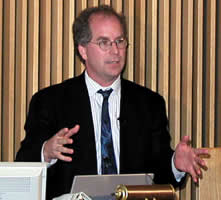
- Image via Wikipedia
Brewster Kahle of the Internet Archive provided the keynote for the SSP’s 2010 Annual Meeting in San Francisco. The motivation for his talk was to outline a plan to make lending and vending work for publishers, librarians, and users.
An interesting premise is that all three traditional roles will or must persist into the future. I found myself questioning this immediately.
Kahle talked about how cheap scanning and storage are now, so that the Internet Archive can hold 150,000,000,000+ Web pages for very little cost.
He talked about how even the Internet Archive has an opt-out system, so that “pictures of your vacation with your former wife” aren’t necessarily stored for the ages.
Apparently, not everything needs to survive in the digital realm for it to be viable.
Kahle talked about “the war” over content and who is going to control this area. Combatants include Amazon, Google, and Apple, and Kahle feels each is trying to dominate the content sphere by controlling the distribution channels. By enabling new publishing platforms and non-traditional publishing approaches, these entrants are changing the face of publishing.
Apple’s focus on the education market will be to control distribution and pricing, making everyone a “division” reporting to Apple — since if you don’t control pricing or distribution, you work for whoever does.
Kahle asked whether publishing is going to repeat the same mistakes as the music industry. His feeling is that a distributed system is the only option, but publishers don’t all see the same threat or feel there’s much risk.
Libraries, which rent services now instead of owning books and provides customer service instead of materials intermediation, are being disenfranchised, despite their importance to the information sphere, Kahle claims. He feels librarians are important allies in creating the distributed space publishers will benefit from in the future.
Kahle then spoke about books on the Internet, choosing books as a convenient way to focus the discussion. I think this was a good choice, because books are where the action is these days.
He quoted data that 10% of books are in-print, 70% are out-of-print, and 20% are out0-of-copyright. In-print books are “buy” books, out-of-print books are “borrow” books, and public domain books are “free” books.
For public domain books (out-of-copyright), Kahle feels we’re pretty well set by scanning and storing them into a distributed network.
For out-of-print books, Kahle believes it’s a bit stickier, and probably requires a combination of search engines and libraries to create a viable solution for users.
For in-print books, Kahle feels the closed gardens of Google, Amazon, and Apple will have to surrender to the distributed solution of the Web, just as AOL’s walled garden broke down fairly rapidly. His solution is “BookServer,” a distributed vending and lending system on the Internet.
Kahle’s talk was well-received, and he was right to focus on books. Look for more coverage from the SSP Annual Meeting soon.
![Reblog this post [with Zemanta]](http://img.zemanta.com/reblog_e.png?x-id=b2054dd9-a2b7-4219-a24f-31c86f3f3092)


